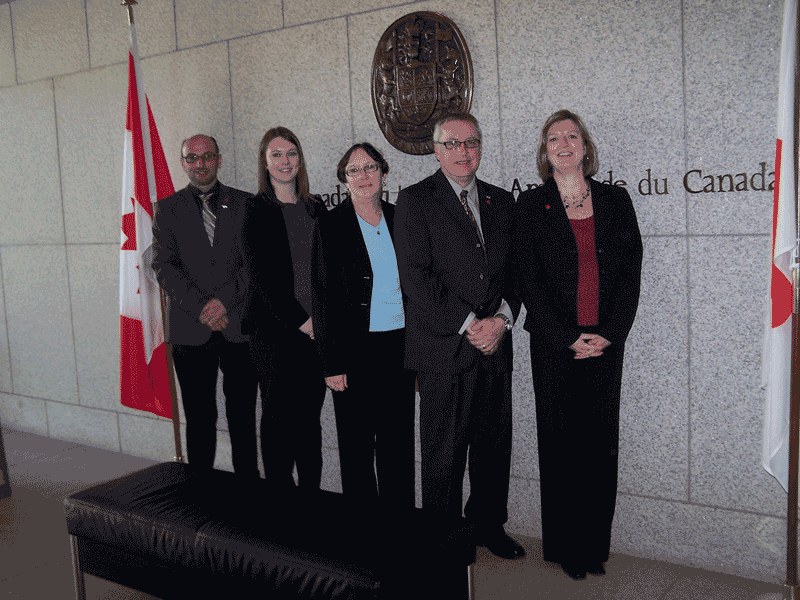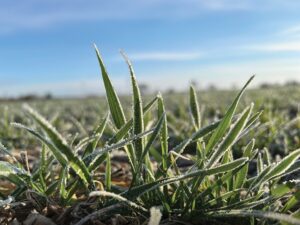CSC Asian program a success
THIRD CANADIAN SOYBEAN MISSION WELL RECEIVED
representatives from the Canadian soybean industry recently spent ten days in Asia promoting the quality of Canadian food-grade soybeans and Canada’s soybean production capabilities and advantages.
The third Canadian Soybean Council (CSC) Mission to Asia was held from February 20 to 29 in the countries of Japan, Singapore and Malaysia. The program was sponsored by the CSC and coordinated by the Canadian International Grains Institute (Cigi). The five member delegation that was a part of the program included Nicole Mackellar, coordinator CSC, Markus Haerle, IP soybean producer from Ontario and Grain Farmers of Ontario Board of Directors member, Martin Harry, eastern marketing manager, SeCan, Laura Anderson, national manager process verification & accreditation, Canadian Grain Commission and Linda Malcolmson, manager of special crops, oilseeds & pulses, Cigi. The program was also supported by the Canadian Soybean Exporters Association who had a number of members present during each of the activities throughout the program.
pictured here: arkus haerle; nicole mackellar; Linda Malcolmson, Manager of Special Crops, Oilseeds & Pulses, Canadian International Grains Institute; Martin Harry, Eastern Marketing Manager, SeCan; Laura Anderson, National Manager, Process Verification & Accreditation, Canadian Grain Commission

The program began on February 20th with the Canadian delegation hosting a seminar at the Embassy of Canada in Tokyo, Japan. The theme of the seminar was “Looking to the Future” and focused on Canada’s Identity Preserved segregation system, Canada’s environmental sustainability practices in soybean production, and the benefits of sourcing Canadian food grade non-genetically modified soybeans. With over 160 participants in attendance, this was the largest seminar of this type the embassy had seen.
The program then moved to Nagano, Japan where the delegation got the first hand opportunity to meet with individual miso and frozen and fried tofu manufacturers. Here the delegation learned the specific characteristics each company was looking for in their soybeans in order to manufacture their products. Tofu production makes up the largest market share in Japanese soyfood production at 49%; miso is second in line at 13%. “Overall companies are very happy with the consistency they are receiving from Canadian soybeans” said Linda Malcolmson, “One company is currently purchasing soybeans from China but is now very interested in Canadian soybeans after hearing about the quality characteristics during our visit.”
The second country on the program agenda was Singapore. On February 24 the delegation hosted an industry seminar in conjunction with the Embassy of Canada and the Singapore Institute of Food Science & Technology. With over 55 participants in attendance there was a very good turnout of representatives from across the soyfood industry. A networking lunch was held after the seminar where there was the opportunity to speak one on one with the participants in attendance. Participants not only during the seminar but also during the networking lunch were very interested in learning more about the Canadian identity Preserved Recognition (CIPRS) program.
While in Singapore the program visited Unicurd Food Company, a tofu manufacturer specializing in dessert tofu. The company is the largest tofu producer in Singapore and uses 6 MT of soybeans a day, when their production lines are running. Currently 60% of their soybeans are coming from Canada. The delegation also had the opportunity to visit Singapore’s leading soybean food and beverage retailer, Mr. Bean. The company has over sixty-five stores across the country and does all of the processing onsite at each store.
The third and final stop of the program was Kula Lumpur, Malaysia. The Canadian delegation hosted an industry seminar there on February 27 in conjunction with the Embassy of Canada. There were over 35 participants in attendance including representatives from the Malaysian media. The industry seminar was represented in an article included in the February 28 edition of the Malaysian Reserve.
The industry tours in Malaysia consisted of Thye Huat Chan, a high-end trading storage facility that moves over 1,000 containers per month of products. They currently have 4,000 tonnes of soybeans that are stored in a temperature controlled warehouse. The next stop was to one of Malaysia’s largest soymilk processors, Ace Canning Corporation, which uses over 3,000MT of soybeans a year to produce their products. The company is currently sourcing all of their soybeans from Canada.
Japan, Singapore and Malaysia are very key markets for Canadian food grade soybeans, that purchase on average a combined total of over 520,000 MT of Canadian soybeans a year. “This program allowed us to build on existing relationships and market shares we have in each of these countries while continuing to push for increases in volumes where possible” says Malcolmson.
By providing information through the different formats of hosting seminars and networking receptions as well as one on one industry visits, the Canadian delegation was able to gather market intelligence on the trends that are currently happening in each of the countries that were visited. “This is valuable information that we can share with the entire soybean value circle in Canada” said Malcolmson.
Having the opportunity to meet with industry representatives as a united front with the Canadian soybean exporters reinforced Canada’s commitment to providing high value, traceable, safe and quality assured Canadian soybeans to the Japanese, Singaporean and Malaysian marketplaces. •
























